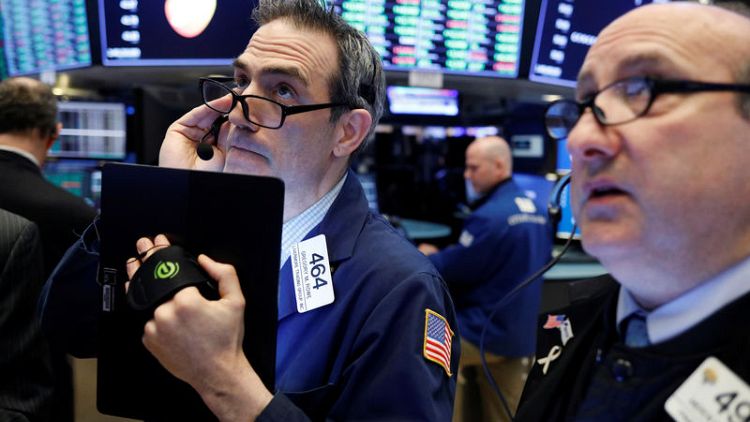By Lewis Krauskopf
NEW YORK (Reuters) - Stock markets around the world moved higher on Friday following signs of progress in U.S.-China trade talks, while the British pound and German bond yields fell after lawmakers rejected Prime Minister Theresa May's Brexit agreement for the third time.
Improved risk sentiment helped buoy benchmark U.S. yields as demand decreased for safe-haven bonds.
MSCI's gauge of stocks across the globe gained 0.49 percent and was on pace to rise more than 11 percent for the quarter.
U.S. officials held "constructive" talks in Beijing, Treasury Secretary Steven Mnuchin said, concluding the latest round of dialogue with China aimed at resolving the trade dispute between the world's two largest economies.
Wall Street indexes briefly pared gains, before recovering, after influential Federal Reserve Vice Chair Randal Quarles gave a bullish view of the U.S. economy and said more rate increases may be needed if recent positive trends in productivity and investment continue.
“The two big drivers of stock returns so far this year have been optimism regarding a U.S.-China trade agreement and that the Fed has become a lot more dovish," said Michael Arone, chief investment strategist at State Street Global Advisors in Boston.
In afternoon trade, the Dow Jones Industrial Average rose 146.98 points, or 0.57 percent, to 25,864.44, the S&P 500 gained 11.29 points, or 0.40 percent, to 2,826.73 and the Nasdaq Composite added 39.60 points, or 0.52 percent, to 7,708.77.
The pan-European STOXX 600 index rose 0.60 percent.
European asset prices were rattled after lawmakers rejected Prime Minister Theresa May's Brexit deal for a third time, leaving Britain's withdrawal from the European Union in turmoil.
The pound weakened against the U.S. dollar following the news, while Germany's 10-year government bond yield fell.
In the U.S., benchmark 10-year notes last fell 6/32 in price to yield 2.4086 percent, from 2.389 percent late on Thursday.
Capital markets have closely followed moves in Treasuries since last week, when the 3-month U.S. yield exceeded the yield on the 10-year note, an inversion of the yield curve that is widely seen as an indicator of a recession.
U.S. consumer spending barely rose in January and income increased modestly in February, suggesting the economy was fast losing momentum after growth slowed in the fourth quarter, data showed.
The dollar index, which measures the greenback against a basket of currencies, rose 0.06 percent, with the euro unchanged at $1.122.
The Turkish lira weakened again and the government promised reforms after a volatile week.
Oil prices rose as U.S. sanctions against Iran and Venezuela as well as OPEC-led supply cuts overshadowed concerns over a slowing global economy.
U.S. crude rose 1.35 percent to $60.10 per barrel and Brent was last at $68.34, up 0.77 percent.
(Graphic: Bonds this week: All about Britain and Italy - https://tmsnrt.rs/2V8yMII)
(Graphic: World FX rates in 2019 - http://tmsnrt.rs/2egbfVh)
(Additional reporting by Karen Brettell in New York, and Ritvik Carvalho and Dhara Ranasinghe in London; Editing by Dan Grebler and James Dalgleish)



